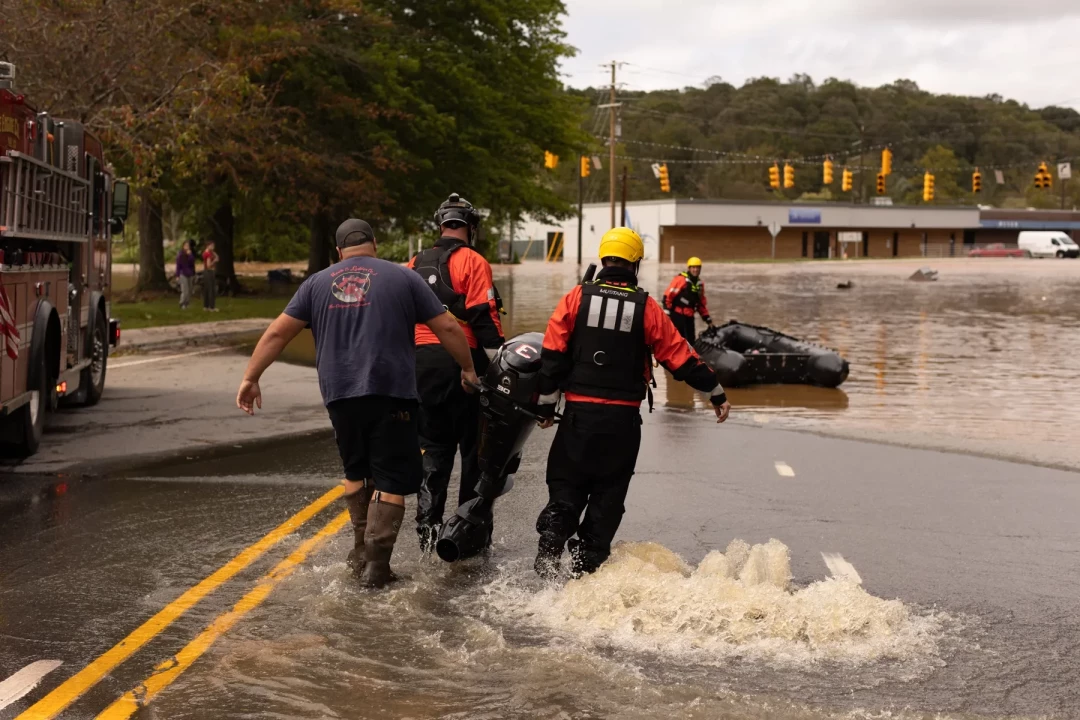News & Articles
Browse all content by date.

Photo: Carolina Public Press
For the past five days, I’ve been watching the devastating news coming out of Asheville, North Carolina. Having lived in Raleigh, the state’s capital, and once considered Asheville as a future home for myself, I keep watching the daily news updates and wondering how this could have happened.
On Oct. 3, The Guardian reported that Hurricane Helene was a category 4 hurricane before it became a tropical storm when it hit land. The storm brought rainfall, strong winds, a storm surge and major flooding to Georgia, Tennessee and the Carolinas.
The article stated, “As the planet warms due primarily to the burning of fossil fuels, hurricanes are bringing stronger winds, higher storm surges, record rainfalls, rendering them deadlier, more destructive and more costly.”
A day earlier, on Oct. 2, CNN reported that Asheville had been touted as a climate haven but the hurricane’s deadly destruction revealed that Asheville, like any other city in the U.S., was never safe.
Home to about 95,000 people, the citizens talked about Asheville as a war zone and officials described the city as post-apocalyptic.
There was a rapid climate analysis recently published by scientists from the Lawrence Berkeley National Laboratory which found that fossil fuel pollution caused more than 50% more rainfall in parts of Georgia and the Carolinas, and that estimated global warming made the rain in these regions 20 times more likely.
Susan Hassol, a climate change communicator and science writer in Asheville, said she and others were under the illusion they lived in a relatively climate-safe place.
Ed Kearns, chief data officer at First Street Foundation, a nonprofit focused on weather risk research, stated, “Risks are increasing more than we as humans can perceive.”
In thinking about the story coming out of Asheville, I thought of a quote from The Disenchanted Earth by Richard Seymour. In writing about climate change and the wildfires around the world, Seymour wrote, “The fires in New South Wales and the floods in South Yorkshire, for instance, are part of the same story. This isn’t a story about ‘them’, I mean to say, but about ‘us’. It will inevitably come for us.”
The story in Asheville is the same story in Duluth and every other city. Whether we’re talking about hurricanes, tropical storms, wildfires, drought or rising temperatures, climate change is now an integral part of our cities’ futures. It’s a story about how all these climate events are interconnected and therefore will have a significant impact on all cities.
And it’s a story about underestimating the impact of these climate events and in so many ways not being ready or prepared for what’s taking place.
The challenge now is all about how each city, including Duluth, chooses to respond and adapt to the climate reality facing all of us.
Three days ago, WDIO reported that we have experienced the warmest September on record and the second driest September on record. Accuweather also reported that various cities in the U.S. had temperatures in September which were above their historical average – including Minneapolis (+6.8 degrees), Denver (+5.2 degrees) and Tucson (+3.8 degrees). And on Sept. 30, the Climate and Economy website shared a news story reporting that Lake Superior is currently at record warmth, with nine degrees above normal for this time of year.
What will Duluth’s story be tomorrow, the day after that and all the days to come?
Right now, we are experiencing warmer temperatures, seasonal droughts, a warmer Lake Superior with pockets of microplastics and algae blooms, and air quality alerts due to the Canadian wildfires. And with a significant loss in our bee, butterfly and bird populations, we’re also seeing more wildlife (including deer, black bears and coyotes) within our city limits.
Also, there’s people from various states, including Texas and California, who are moving to Duluth as well as individuals and companies buying up properties around our city for future investments.
Things are definitely changing in our city. But, like in Asheville, will we keep looking the other way, telling ourselves that Duluth is a climate haven or believing that we have plenty of time to get ready?
Will our elected officials and city leaders choose not to engage in a public conversation with the citizens about climate change or even nominate people for the different commissions in Duluth who may have a better understanding of and more grounded perspective about climate change?
Recently, I’ve seen documents or correspondence which clearly shows that the mayor and his administration are not responding to requests to speak to or meet with representatives from different climate and environmental groups as well as members from the city commissions. If this continues, what kind of story will our city be creating when it comes to our climate future?
Take a moment to think about that and let it sink in.
| Tweet |


